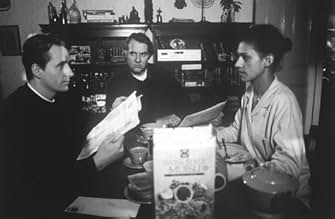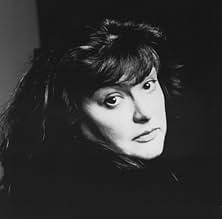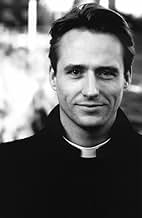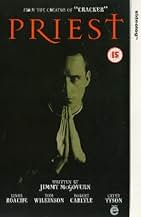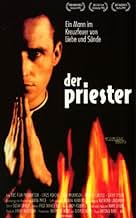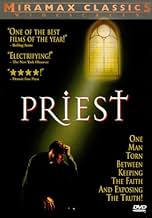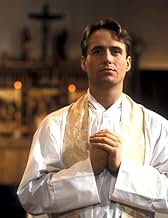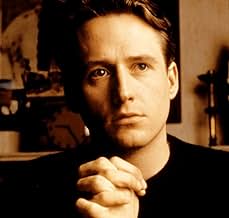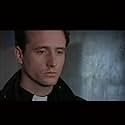PUNTUACIÓN EN IMDb
7,1/10
11 mil
TU PUNTUACIÓN
Un sacerdote católico homosexual descubre durante el confesionario que una joven está siendo abusada sexualmente por su padre y tiene que decidir cómo lidiar con ese secreto y el suyo propio... Leer todoUn sacerdote católico homosexual descubre durante el confesionario que una joven está siendo abusada sexualmente por su padre y tiene que decidir cómo lidiar con ese secreto y el suyo propio.Un sacerdote católico homosexual descubre durante el confesionario que una joven está siendo abusada sexualmente por su padre y tiene que decidir cómo lidiar con ese secreto y el suyo propio.
- Nominado a 1 premio BAFTA
- 5 premios y 3 nominaciones en total
Reseñas destacadas
11 years after its release, I finally got around to watching one of 1994's most controversial films. I don't know what took me so long.
This is the story of Father Greg Pilkington, an idealistic young priest appalled by the liberal-thinking, older priest he shares a congregation with. Clashes and airs of superiority from Father Greg set up, almost calculatedly, his crushing and inevitable fall from grace. Try as he might, Father Greg, pious and as intolerant as ever, cannot suppress his sexuality and takes to the gay bar scene. A casual pick up turns into an affair which in turn becomes a personal and professional disaster as an equally intolerant society pushes him towards wrongful arrest and a verdict of "guilty." Father Greg becomes the object of derision and hatred by the bigoted, close minded community, itself a reflection of all the young priest exhibited in but a show of intolerance and sanctimoniousness.
The real heart of this picture occurs in the confessional when a desperate young girl tells of ongoing sexual abuse at the hands of her father. Eventually, this information becomes a test of faith for Father Greg as he questions his spirituality, the laws of the church and God himself.
During all of this the older priest, Father Matthew, preaches of "the trappings of power" that the Church has saddled itself with - and how the trappings have gotten in the way of the message of God, of love, of tolerance, of patience and compassion. As might be expected, the Church's higher ups have little patience for this sort of talk - and the congregation itself shuns Father Greg turning mass into an explosive show of blind eyed fanaticism.
As Father Greg, Linus Roche gives a searing, searching performance as the young tormented priest. His fall and redemption, the center of the story, comes across with an earnestness that steers clear of sensationalism, despite the loaded message of the movie. Tom Wilkinson, as ever, gives a performance that is as natural and believable - and likable - as anything he's done before or since. (Side note: having waited so long to watch this it's interesting to see these two actors with important roles in this year's new and glorious Batman Begins.) A truly remarkable and emotional film.
This is the story of Father Greg Pilkington, an idealistic young priest appalled by the liberal-thinking, older priest he shares a congregation with. Clashes and airs of superiority from Father Greg set up, almost calculatedly, his crushing and inevitable fall from grace. Try as he might, Father Greg, pious and as intolerant as ever, cannot suppress his sexuality and takes to the gay bar scene. A casual pick up turns into an affair which in turn becomes a personal and professional disaster as an equally intolerant society pushes him towards wrongful arrest and a verdict of "guilty." Father Greg becomes the object of derision and hatred by the bigoted, close minded community, itself a reflection of all the young priest exhibited in but a show of intolerance and sanctimoniousness.
The real heart of this picture occurs in the confessional when a desperate young girl tells of ongoing sexual abuse at the hands of her father. Eventually, this information becomes a test of faith for Father Greg as he questions his spirituality, the laws of the church and God himself.
During all of this the older priest, Father Matthew, preaches of "the trappings of power" that the Church has saddled itself with - and how the trappings have gotten in the way of the message of God, of love, of tolerance, of patience and compassion. As might be expected, the Church's higher ups have little patience for this sort of talk - and the congregation itself shuns Father Greg turning mass into an explosive show of blind eyed fanaticism.
As Father Greg, Linus Roche gives a searing, searching performance as the young tormented priest. His fall and redemption, the center of the story, comes across with an earnestness that steers clear of sensationalism, despite the loaded message of the movie. Tom Wilkinson, as ever, gives a performance that is as natural and believable - and likable - as anything he's done before or since. (Side note: having waited so long to watch this it's interesting to see these two actors with important roles in this year's new and glorious Batman Begins.) A truly remarkable and emotional film.
You need to have watched a few BBC dramas, and like the style in order to really appreciate this film. It may seem slow in the eyes of viewers used with the American cinema approach, but I tremor to the thought of how Hollywood could have spoiled this film, and I am happy that the script fell in Brits hands first. 'Priest' is a complex film, dealing with hard issues of incest and homo-sexuality, but first with the conflict between the priest mission as a moral leader and the Procustian laws of the Catholic church he needs to obeye by. The ideological content may be controversial for many, it was partly for me as well, but I cannot help admiring the well kept balance, the dramatic tension, and the masterful way the excellent team of actors is filling the roles. I wonder how comes that Linus Roache is not a bigger star after having made this film about one decade ago. He certainly deserves to be in the same line as some of his generation colleagues who have succeeded that well in American and world cinema.
Yes, the film is controversial, you may not agree with some of the ideas and it looks sometimes as a cinema manifest, but it is still a good and human film. I less liked the final, which is the only place in the script where art logic seems to surrender to the religious concepts. 9/10 on my personal scale.
Yes, the film is controversial, you may not agree with some of the ideas and it looks sometimes as a cinema manifest, but it is still a good and human film. I less liked the final, which is the only place in the script where art logic seems to surrender to the religious concepts. 9/10 on my personal scale.
This movie was incredibly moving, especially the last 10 minutes. It accurately portrays the struggle one would go through, being Catholic, gay, and a priest, all at once. Yikes. The ending is very VERY powerful, and sends a strong message that we learn and grow through our suffering, and surviving our hardships enables us to help others. If you're up for an emotionally powerful movie, see this movie!! You'll love the ending!
From the symbolic introductory scene of "Priest" wherein an old, weary-looking priest yanks a huge crucifix from the church altar, proceeds to carry it through the streets of his impoverished town as if he were Jesus himself, and proceed to bash through the door of his presbytery, you know you're in for something different - stimulating, controversial, thought-provoking. "Priest" is VERY MUCH that movie.
The old priest's clerical replacement comes in the form of Father Greg (Linus Roache, in a star-making role), a young, fair-haired, boyishly handsome visionary who, with typically youthful verve, strives to bring the Catholic Church directly to the people (well, to the Catholics, anyway), and receives his actions with decidedly mixed feelings. The older priest still in residence, Father Matthew (the excellent Tom Wilkinson), who has long settled into amiable apathy, inclines toward drink while maintaining a relatively clandestine relationship with his black, attractively careworn housekeeper (the underused Cathy Tyson). There is initial friction as the Old and New Worlds collide. Father Matthew dismisses Father Greg's modernistic sermons, while Father Greg frowns upon Father Matthew's casual stance on papal celibacy. Eventually, we learn Father Greg has his own difficulty with celibacy...but with other men.
As the story proceeds, we are drawn into the emotional and moral struggles of Father Greg as he wrestles not only with his own social and spiritual ethics, but those of his parish. In one particularly chilling confessional scene, a male member of the parish practically flaunts his sexual desires while "justifying" his incestuous advances toward his teenage daughter.
"Priest" is an important, ambitious project and yields emotional power in its depiction of moral adversity. But it's a mixed blessing. Some of the scenes come off overbaked and melodramatic, while the resolution of the piece should be more powerful and less compromising; instead it comes off manufactured and unrealistic, hurting its overall impact.
In fairness, "Priest" does bring out the hypocrisy in both priests, as well as the parish. Nobody comes off saintly here, just flawed and human. An interesting bi-note is that there have been no comments in the fact that the elder priest is having a sexual relationship with a BLACK housekeeper. Forty years ago, according to religious purists, the Bible interpreted ethnically mixed relationships and marriages as abominations as well. At least some headway HAS been made.
Is "Priest" anti-Catholic in its message? To an extent, yes. The Catholic's Church's unyielding, unprogressive, medieval doctrines are brought to task here, never more pointedly than in the scene where Father Greg, agonizing over whether to prevent the continued sexual abuse of the young girl and report the father to authorities, or respect the confidentiality of the confessional and remain silent, reluctantly chooses the latter.
While I deem this movie to be a stronger platform for social tolerance, `Priest' still drums home beautifully the message that organized religion is still used as a tool to govern instead of instill moral standards, particularly in other countries, and as a persecutive weapon against certain sectors of society that do not conform to those rigid standards. As a consequence, the Church has provided a comforting harbor and hazardous safety zone for certain "acceptable" bigotries.
We need more brave, topical films like "Priest" to confront such important social issues and display them front-and-center.
The old priest's clerical replacement comes in the form of Father Greg (Linus Roache, in a star-making role), a young, fair-haired, boyishly handsome visionary who, with typically youthful verve, strives to bring the Catholic Church directly to the people (well, to the Catholics, anyway), and receives his actions with decidedly mixed feelings. The older priest still in residence, Father Matthew (the excellent Tom Wilkinson), who has long settled into amiable apathy, inclines toward drink while maintaining a relatively clandestine relationship with his black, attractively careworn housekeeper (the underused Cathy Tyson). There is initial friction as the Old and New Worlds collide. Father Matthew dismisses Father Greg's modernistic sermons, while Father Greg frowns upon Father Matthew's casual stance on papal celibacy. Eventually, we learn Father Greg has his own difficulty with celibacy...but with other men.
As the story proceeds, we are drawn into the emotional and moral struggles of Father Greg as he wrestles not only with his own social and spiritual ethics, but those of his parish. In one particularly chilling confessional scene, a male member of the parish practically flaunts his sexual desires while "justifying" his incestuous advances toward his teenage daughter.
"Priest" is an important, ambitious project and yields emotional power in its depiction of moral adversity. But it's a mixed blessing. Some of the scenes come off overbaked and melodramatic, while the resolution of the piece should be more powerful and less compromising; instead it comes off manufactured and unrealistic, hurting its overall impact.
In fairness, "Priest" does bring out the hypocrisy in both priests, as well as the parish. Nobody comes off saintly here, just flawed and human. An interesting bi-note is that there have been no comments in the fact that the elder priest is having a sexual relationship with a BLACK housekeeper. Forty years ago, according to religious purists, the Bible interpreted ethnically mixed relationships and marriages as abominations as well. At least some headway HAS been made.
Is "Priest" anti-Catholic in its message? To an extent, yes. The Catholic's Church's unyielding, unprogressive, medieval doctrines are brought to task here, never more pointedly than in the scene where Father Greg, agonizing over whether to prevent the continued sexual abuse of the young girl and report the father to authorities, or respect the confidentiality of the confessional and remain silent, reluctantly chooses the latter.
While I deem this movie to be a stronger platform for social tolerance, `Priest' still drums home beautifully the message that organized religion is still used as a tool to govern instead of instill moral standards, particularly in other countries, and as a persecutive weapon against certain sectors of society that do not conform to those rigid standards. As a consequence, the Church has provided a comforting harbor and hazardous safety zone for certain "acceptable" bigotries.
We need more brave, topical films like "Priest" to confront such important social issues and display them front-and-center.
Priests are not often the heroes of movies:some famous predecessors were Robert Bresson's "journal d'un curé de campagne" (1945),Luis Bunuel's "Nazarin" (1958) and Jean-Pierre Melville 's "Leon Morin prêtre" (1961).But none of these directors went as far as Antonia Bird .Their movies were perhaps esthetically better,but nothing shocking for people who were brought up religiously ,nothing like the pictures of this priest lying on a bed with his lover.One will add that Bunuel's movie was looked upon as "very Christian" by the Spanish censorship when it was exactly the contrary.But it's difficult to consider Bird's work a fable:it's a realistic story,where sex occupies the center of the plot:sex between the other priest and the housekeeper,sex between the father and his daughter,sex between Rochman and Carlyle .Bird's style,though depicting the poor sides of Liverpool is very different from Kenneth Loach's .Her pictures are polished up ,like the one in confessional where the incest father is speaking through the grille ,or the two lovers on the beach.
Bird's movie is very interesting because it broaches the problem of celibacy in the catholic religion (protestant priests are allowed to marry aren't they),and,as the hero remarks "Jesus did not ask for chastity did he?"A hero who is not always very smart:"be discreet" he tells to his colleague who sleeps with the housekeeper,but he kisses his lover in a car in broad daylight.
The final battle in the church is particularly interesting,because it's a battle of words,repeating quotations from the Bible,and there are so many ways of interpreting its meanings .It seems that the priest uses the New testament ( judge not lest...,Mary Magdelene, forgive not seven times but seventy)whereas his enemy draws from the old one (a man sleeping with a man is an abomination).
The seal of the confessional subject is not that much new however:even in 1953,Hitchcock made "I confess" in which Montgomery Clift was confronted to the same problem.
Best line;the older priest ,telling a shocked congregation that God is probably too busy to care about what men do with their d.....
Bird's movie is very interesting because it broaches the problem of celibacy in the catholic religion (protestant priests are allowed to marry aren't they),and,as the hero remarks "Jesus did not ask for chastity did he?"A hero who is not always very smart:"be discreet" he tells to his colleague who sleeps with the housekeeper,but he kisses his lover in a car in broad daylight.
The final battle in the church is particularly interesting,because it's a battle of words,repeating quotations from the Bible,and there are so many ways of interpreting its meanings .It seems that the priest uses the New testament ( judge not lest...,Mary Magdelene, forgive not seven times but seventy)whereas his enemy draws from the old one (a man sleeping with a man is an abomination).
The seal of the confessional subject is not that much new however:even in 1953,Hitchcock made "I confess" in which Montgomery Clift was confronted to the same problem.
Best line;the older priest ,telling a shocked congregation that God is probably too busy to care about what men do with their d.....
¿Sabías que...?
- CuriosidadesThe Catholic Church in Ireland were very vocal about their views in having the film banned from theatrical distribution. The film censor disagreed and the film was released with an 18 certificate. This marked a major turning point in the relationship between the church and the Irish Film Censor board.
- PifiasFather Greg holds up a communion wafer which is smooth. The scene cuts to Graham and then back to Father Greg, and the wafer has a diagonal line across it.
- Citas
Father Greg Pilkington: [addressing Father Redstone in Latin] Abi et futue te ipsum, sordide senex.
[Translation: Go fuck yourself, you dirty old man]
- Versiones alternativasThe US version has been cut by seven minutes.
- Banda sonoraGreen Green Grass of Home
Composed by Curly Putman
Performed by Tom Wilkinson
Copyright Tree International
by kind permission of Burlington Music Co. Ltd./Warner Chappell Music Ltd.
Selecciones populares
Inicia sesión para calificar y añadir a tu lista para recibir recomendaciones personalizadas
- How long is Priest?Con tecnología de Alexa
Detalles
- Fecha de lanzamiento
- País de origen
- Sitio oficial
- Idiomas
- Títulos en diferentes países
- Actos privados
- Localizaciones del rodaje
- Blundellsands, Merseyside, Inglaterra, Reino Unido(beach scene with boy and coffee)
- Empresas productoras
- Ver más compañías en los créditos en IMDbPro
Taquilla
- Recaudación en Estados Unidos y Canadá
- 4.165.845 US$
- Fin de semana de estreno en EE. UU. y Canadá
- 113.430 US$
- 26 mar 1995
- Recaudación en todo el mundo
- 4.165.845 US$
- Duración1 hora 45 minutos
- Color
- Mezcla de sonido
- Relación de aspecto
- 1.66 : 1
Contribuir a esta página
Sugerir un cambio o añadir el contenido que falta



